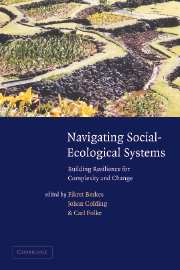Book contents
- Frontmatter
- Contents
- List of contributors
- Preface
- Acknowledgements
- Foreword: The backloop to sustainability
- 1 Introduction
- Part I Perspectives on resilience
- Part II Building resilience in local management systems
- Part III Social-ecological learning and adaptation
- Part IV Cross-scale institutional response to change
- Index
Part III - Social-ecological learning and adaptation
Published online by Cambridge University Press: 13 August 2009
- Frontmatter
- Contents
- List of contributors
- Preface
- Acknowledgements
- Foreword: The backloop to sustainability
- 1 Introduction
- Part I Perspectives on resilience
- Part II Building resilience in local management systems
- Part III Social-ecological learning and adaptation
- Part IV Cross-scale institutional response to change
- Index
Summary
Introduction
Given that some level of uncertainty always exists in complex systems, decision makers need to continuously monitor and integrate appropriate ecological, social, and economic information into management. Such adaptive management, whereby policy making is seen as an iterative experiment, acknowledges uncertainty, rather than assuming it away. Carrying out adaptive management requires a great deal of information to provide feedback to the manager regarding the consequences of the policy experiment. In addition to some of the conventional kinds of ecological and economic data, adaptive management requires qualitative information in the form of feedback from the social–ecological system to indicate the direction in which management should proceed.
Where does the information for adaptive management come from? Some of it comes from conventional science and social science, but some of it can also come from the knowledge held by the resource users themselves. Many local and traditional knowledge systems are characterized by the use of local ecological knowledge to interpret and respond to environmental feedback to guide the direction of resource management. These local management systems have something in common with adaptive management – they emphasize feedback learning and address uncertainty that is intrinsic to all systems. How do we access and use local and traditional knowledge, and what kinds of arrangements are necessary to bring together the full spectrum of knowledge pertinent to a problem?
- Type
- Chapter
- Information
- Navigating Social-Ecological SystemsBuilding Resilience for Complexity and Change, pp. 187 - 188Publisher: Cambridge University PressPrint publication year: 2002

